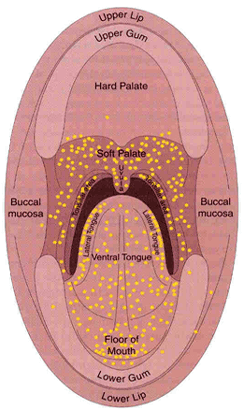Oral Cancer: Treatment and Prevention
- Any red or white lesion persisting longer than two weeks warrants referral for biopsy.
- Any mouth sore that won't heal or bleeds easily; any persistent lump or soreness in the mouth, throat, or tongue; or any difficulty chewing or swallowing warrants further investigation, which includes considering oral cancer as a cause.
- Treatment of oral squamous cell carcinoma is guided by clinical staging and may involve surgical resection, lymph node dissection, radiation therapy, or chemotherapy.
- Long-term follow-up is advised because of the potential for recurrence or development of additional lesions.
- Emerging evidence suggests that vaccination against HPV can help prevent oral cancers. Vaccination can be started at age 9, and is recommended through age 26 for those who were not vaccinated when they were younger.
Cancers most commonly develop on the tongue, floor of mouth, and lower lip vermilion. Cancer-prone areas are indicated by yellow dots

References
Smith RA, Cokkinides V, von Eschenbach AC, Levin B, Cohen C, Runowicz CD, et al. American Cancer Society guidelines for the early detection of cancer. Ca: a Cancer Journal for Clinicians. 2002;52(1):8-22.
www.cdc.gov/OralHealth/oral_cancer/index.htm Accessed 9/23/18
Nielsen, Kristoffer Juul, et al. "The effect of prophylactic HPV vaccines on oral and oropharyngeal HPV infection—a systematic review." Viruses 13.7 (2021): 1339.
Tsentemeidou, Aikaterini, et al. "Human papillomavirus vaccine to end oropharyngeal cancer. A systematic review and meta-analysis." Sexually Transmitted Diseases 48.9 (2021): 700-707.